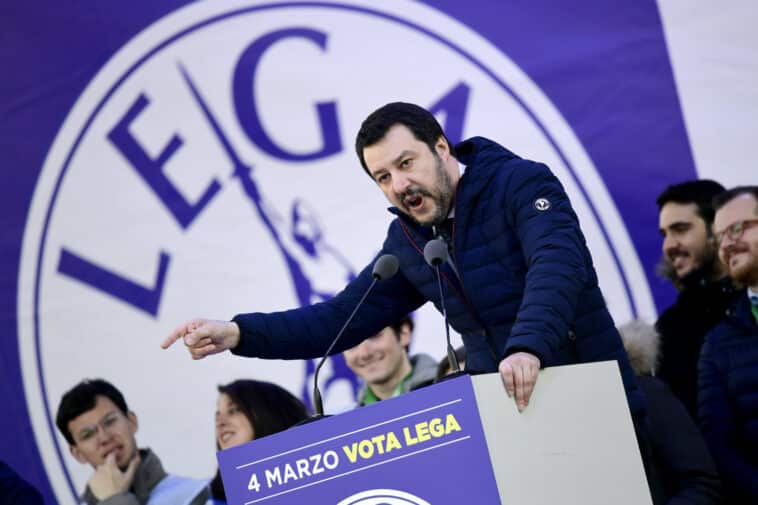

By Dave Stockton
AFTER NEARLY three months of negotiations, a coalition government has been formed in Italy between the Five Star Movement (M5S) and the League (formerly Lega Nord).
Coverage of the government’s difficult birth focussed on the Italian President’s decision to veto the coalition’s choice of a eurosceptic Finance Minister, but the real headline policy is the proposal to round up refugees in concentration camps before deporting half a million of them. The government has promised to put the boot in by slashing meagre payments to those refugees permitted to remain, and condemning thousands to death by ending rescue operations in the Mediterranean.
For good measure, the coalition plans to follow France’s lead by bulldozing Roma camps, and to “strictly regulate” (i.e. stop) the opening of new mosques (which are few and far between anyway).
The man responsible for overseeing what threatens to become the largest forcible deportation since the Second World War is La Lega’s leader, Matteo Salvini, who comfortably rubs shoulders with fellow leaders of the European far right, even going so far as to host meetings with parties of the fascist fringe including the Greek neo-Nazi Golden Dawn. Salvini’s first act on taking up the post of Interior Minister was to set out on a tour of the country to size up the “problem”.
The entry of M5S into coalition with La Lega reflects the growth of xenophobia and chauvinism within the ranks of an ostensibly left wing party that presents itself as an anti-establishment answer to the corrupt parties of the ‘system’, with which it pledged never to enter into coalition. Founded in 2008 by a professional clown, Beppe Grillo, it got its break by engaging in demagogic, if not always inaccurate, denunciations of Italy’s political elites. It should be noted that the conviction and imprisonment of La Lega’s founder and former leader for embezzling hundreds of thousands of euros in public funds, apparently did not present a significant obstacle to M5S negotiating a coalition deal.
With its denunciations of austerity and the tyranny of the European Union (which installed Mario Monti at the head of an austerity government of unelected technocrats in 2011), M5S’ claim to be a party of the left was not so easily exposed as an illusion. But, as the prospect of power approached, the party discarded the motley of left populism and donned the cloak of La Lega’s virulent anti-refugee racism.
The issue of the budget and Italy’s debt, which will be made even more eye watering by the pledges to slash taxes and introduce a supposed universal basic income, will not come up till the autumn; so, for the time being, the government can get on with herding the refugees into camps. But a major crisis with the EU and Germany is inevitable unless Salvini and his puppet prime minister Giuseppe Conti back down on their tax cuts and spending plans.
Meanwhile, Italy’s economy, even at the peak of the recovery from the 2008 Great Recession, is in big trouble. Per capita GDP in Italy is still more than eight per cent below what it was when Lehman Brothers crashed in 2008. Quite incredibly, it is lower now than when the country joined the Eurozone, a fact the eurosceptics drive home whenever they can. Unemployment stands at 11 per cent, down from a high of 13.1 per cent in 2014, but still double the 5.8 per cent pre crisis level. Youth unemployment, which reached 43 per cent, is now 31 per cent. And, like Britain and Spain, Italy has undergone a long period of falling real wages.
The country still suffers from massive inequality between the North, where approximately 75 per cent of GDP is produced and the South, the Mezzogiorno. As a result, GDP per person is more than 40 per cent lower in the South and unemployment much higher. It’s no surprise that M5S’ programme of economic populism, including a citizens’ basic income of €780 a month, and a national investment bank, swept Berlusconi’s former stronghold.
Faced with the most reactionary government since Mussolini, political opposition will be hampered by the weakness and demoralisation of the Italian left, which has been shattered by decades of opportunist adaptation to the now thoroughly bourgeois Democratic Party. There are no shortcuts to rebuilding a mass, independent, working class party, but this goal should be initiated by building a united front of resistance to the new government.
The Italian trade unions still have a relatively high density and have proved they are still are capable of action. Likewise, the youth have shown time and again their capacity for self-organisation. Defending the immigrants against deportation will be an urgent priority. So, too, will be meeting the needs of the unemployed and the workers whose real wages have stagnated or declined.
Moreover, the government’s programme is riven by contradictions; cutting taxes and ending austerity; picking fights with the EU and the Italian political elite. Further constitutional crises are a real possibility. In the end, the popular base of the populists, won through demagogy and the criminal pro-capitalist policies of the reformist left, needs to be undermined by building fighting organisations that can rally anti-racist workers, youth, and migrants to a programme that makes Italy’s oligarchs pay for the crisis of their sclerotic system.
Italy today is a veritable tinderbox, and with the far right preparing to strike the spark, the response of the labour movement in the summer months will be crucial to preventing a racist conflagration